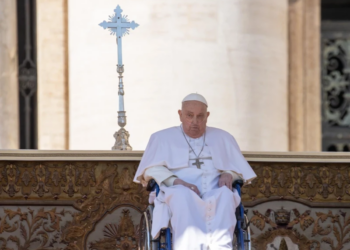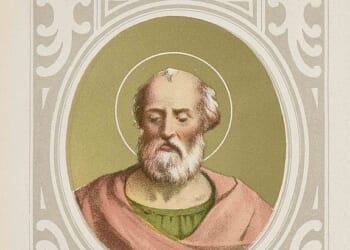Pope Francis died on Easter Monday morning. In the deathly stillness of the Supreme Pontiff, the Church is plunged into a frenzy of activity. The death must be formally announced; his belongings gathered and saved for posterity; his funeral arranged, and of course, a new pope must be elected.
But these monumental tasks are the job of suitably mighty men: Cardinals, bishops, and governors of Vatican City. Amid the many tasks of the Church in this time, one obligation stands out for the whole of her people: to pray for the Pope’s soul.
The Church has an official nine-day mourning period for the death of her Papa, during which the faithful may view their Pope and pray for his repose. And, despite the beauty of the Pope dying near to Easter Sunday, this creates a certain tension in this liturgical season. The joy of Easter is paired with the mourning and urgent intercessions of a death.
I can’t help but think of the ancient custom of the Church’s Rogation Days. Named for rogation, meaning “humble entreaty,” these are days in the liturgical calendar specifically set aside for petition, asking God for protection, forgiveness, and a blessed harvest the upcoming season. Their history is long, going back to at least the 400s A.D. and, for much of Christendom, were marked by periods of fasting and penance.
Rogation Days created a similar liturgical tension as our Papal mourning does this week. The main Rogation Day is April 25th, which—as it does this year—often coincides with the Easter Octave, and almost always in the Easter season. So, the Church was left almost split in her liturgies—singing and celebrating an Easter praise, while simultaneously fasting in mournful petition for her many desperate needs.
Rogation Days themselves are no longer mandatory in the United States, as bishops’ conferences throughout the modern world used their new authority after Vatican II to lessen these mainly-agricultural festivals. And even before their cancellation, Rogation Days had long stopped being days of fasting due to their Paschal timing. But they still retained their somewhat-somber character as days of intercession, frequently marked by litanies or processions to ask God for His needed favor. The April 25th Rogation Day featured purple liturgical vestments and forwent the Gloria at Mass virtually without exception, unless that day should be Easter Sunday itself.
Indeed, the Rogation traditions strikes us as odd in a joyous Easter season. But there is an important lesson in this ancient pairing of Easter and somber intercession, just as there’s an important lesson in our Papal mourning period this week.
Easter is—and should be—a time of intense celebration. Our Lenten obligations stop at the Easter Vigil, for we cannot fast while the bridegroom is with us (Mk. 2:19). It is a natural thing, then, that Rogation Days lost their fast of the centuries so long as they remained tied to this great Easter joy.
Yet the Church stubbornly maintained a certain sobriety in the Rogation obligations, and even this week is not shying away from a certain kind of mourning during our happy Easter Octave. It can be a needed reminder of the words of St. Paul, which we just read on Easter Sunday:
For our paschal lamb, Christ, has been sacrificed.
Therefore, let us celebrate the feast,
not with the old yeast, the yeast of malice and wickedness,
but with the unleavened bread of sincerity and truth. (1 Cor. 5:7-8)
There is an art to both what we celebrate and the way we celebrate. Our penances are moderated in Lent by the occasional Solemnity, like the Annunciation or St. Joseph’s Feast Day, and this is fitting. We not only need the reprieve, but it reminds us that even during Lent, Christ has still been raised, and we are living in His Kingdom. Our feasting should similarly be moderated in Easter by the common virtues of prudence and temperance. Our bodies still need healthy food. And, while we’re living with Jesus’ salvation, this salvation has not yet been fully consummated as we await our full happiness in heaven (Tit. 2:11-14).
This is not to say that our celebration should be in anyway lessened. Our Easter joy ought to be full-throated and sincere. But it should also be holy. In many years I, at least, have either overdone penance in Lent only to become irritable and weak, or overeaten in the Octave to discomfort and bloating (or a little bit of both). In my excesses, I missed the point of both our fasting and our feasting.
We fast to remember the upcoming Resurrection. And we feast because we have redemption from all that causes us to fast. Easter is worth celebrating because of Good Friday, just as Good Friday is “Good” because of Easter.
We suffer the many pains of a fallen world, in and out of liturgical season. We are in need of God’s help always, in Lent and in Easter. But we have God’s help always—in Lent and in Easter—because Jesus is risen from the Tomb and lives forever.
So, the Church for many centuries judged it appropriate to wear purple even one day in Easter. And the Church judges it appropriate even this Easter Octave to remember the passing of her temporary leader. Not, in either case, to decrease the force of Easter’s Alleluia; but, in both cases, to demonstrate its full power. They both throw into stark relief the two great Paschal truths that we need saving, and that we are saved.
Indeed, a man and a Pope has died, which is cause for sobriety. But we know that Pope Francis’ death is not the end for him. And the Pope’s death is not the end for the Church. And all that, only because of the power of Easter, and the new creation brought forth in Christ’s Resurrection.
Jorge Mario Bergoglio now stands before his risen Christ. Like all of us, he stands in need of mercy so that he, too, can rise with his Savior. And we, the living Church, pray for him. His office sits vacant, and so we also pray for his successor. Both aspects—a man’s soul and the Pope’s office—are very weighty, and so are worth some humble rogation. But resurrected grace offers itself to them both. And so even our rogation is not so serious or dour to not fit into the Easter season. In fact, it might even teach us something about joy.
Eternal rest grant unto Pope Francis, O Lord, and let perpetual light shine upon him. May his soul, and the souls of all the faithful departed, through the mercy of God, rest in peace. Amen.
Photo by Marc Mintel on Unsplash


















